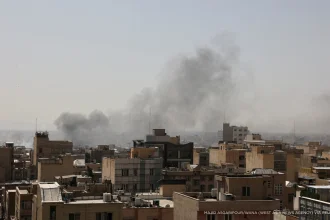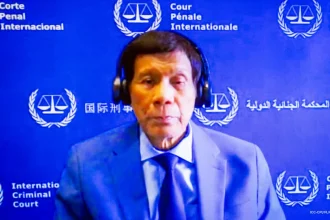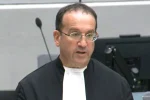
To sum up:
+ Legal standoff in the South China Sea: President Bongbong Marcos maintains a steadfast adherence to international law in defining maritime boundaries, in contrast to aggressive maneuvers by other nations in the region.
+ Global backing grows: Support for the 2016 arbitral award has swelled to 27 nations, with countries like Australia and Germany standing firm on the need for a rules-based order and free navigation in the contentious South China Sea.
+ China’s defiant stance: Despite international consensus, China continues to reject the 2016 award, dismissing it as illegal and refusing to participate in arbitration, escalating tensions in the region.
Metro Manila, Philippines — The country’s policy in the West Philippine Sea is anchored on the United Nations Convention on the Law of the Sea (UNCLOS) and the binding 2016 arbitral award.
Eight years on, Manila marks July 2016 as the defining moment that affirmed to the community of nations that the rule of law prevails and peace and stability in the South China Sea could only be achieved through the rules-based order.
In his speech during the International Institute for Strategic Studies Shangri-La Dialogue in Singapore on May 31, President Marcos said the Philippines has made a conscious effort “to align our definition of our territory and our maritime zones with what international law permits and recognizes”. “So, the lines that we draw on our waters are not derived from just our imagination, but from international law,” said Marcos. He added that the country’s strategy in upholding rule of law is in stark contrast to assertive actions by other countries through force, intimidation, and deception.National Security Council Deputy Director General Jonathan Malaya said in an interview that the Philippines has come a long way in terms of enforcing and asserting the arbitral award. “The Philippine government under the term of President Marcos sent a clear message to the world that we will assert our rights, stand by the 2016 arbitral ruling and the rules-based order,” said Malaya.
2016 arbitral award defined
The Department of Foreign Affairs said the arbitral award is a significant contribution to international law and the interpretation and application of the UN Convention on the Law of the Sea (UNCLOS).
“The award conclusively settled the issue of historic rights and maritime entitlements in the South China Sea. Claims to historic rights, or other sovereign rights or jurisdiction beyond the geographic and substantive limits of UNCLOS-provided maritime entitlements are without legal effect,” the DFA explained.The tribunal also ruled that historic claims over resources within the ‘nine-dash line’ had “no basis in law and is without legal effect”.
The DFA said the ruling declared that Mischief Reef and Second Thomas Shoal (Ayungin Shoal) are within the exclusive economic zone (EEZ) and continental shelf (CS) of the Philippines.
Growing support for the 2016 arbitral award
As of July 2024, the DFA told NewsWatch Plus that 27 countries support the award. These are Australia, Canada, Denmark, France, Germany, India, Ireland, Japan, Lithuania, Netherlands, New Zealand , Norway, Portugal, United States, United Kingdom, Austria, Belgium, Czechia, Finland, Greece, Italy, Poland, Romania, Slovakia, Spain, Sweden, and the Republic of Korea. “In terms of support from other governments, expressions of support have grown over time. We have also received statements of support from 27 countries, whether individually or as part of a group of states,” the DFA added. In an exclusive interview with NewsWatch Plus, Australian Ambassador to the Philippines HK Yu said Australia has been consistent on the South China Sea. “Rules-based order has to prevail when it comes to freedom of navigation and overflight that is in the interest of everyone in the world, in particular to the South China Sea,” she said. “It’s important that the South China Sea remains open to the global community and it is ruled by UNCLOS. It makes very clear what is allowed and what isn’t and it’s in everyone’s interest for the rule of law to prevail,” she added. The Australian top diplomat in Manila also reiterated that her country is among the first nations to issue a statement of support and sound alarm over aggressive behaviors in the South China Sea. “All the tweets that I have been issuing following the Marcos administration statements following the concerns that they have experienced in the South China Sea,” she added.In a separate interview with NewsWatch Plus, German Ambassador to the Philippines Andreas Pffafernoshcke said Manila and Berlin are collaborating to safeguard international rules-based order. “We are convinced that the rules-based international order is the basis for a stable world, peaceful development,” he said. Pffafernoschke pointed to what concerns Germany in the West Philippine Sea. “Escalation of tensions is a big concern and we hope that there will be no further escalation of tensions,” he said. India has joined the list of countries also affirming the arbitral award. “Countries have the responsibility to behave in a manner that contributes to peace and stability and larger countries have larger responsibilities,” said former Indian Ambassador to the Philippines Shambhu Kumaran in an interview.
The arbitral award and ways forward
The government recently welcomed the inclusion of portions of the arbitral award to the advisory opinion issued by the International Tribunal for the Law of the Sea (ITLOS) in response to the request made by the Commission of Small Island States on Climate Change and International Law in December 2022.
“This bolsters and reinforces the legitimacy of the final and binding 2016 arbitration award and its unassailable status as part of the corpus of international law,” the DFA said in a statement. This year, Manila has also filed a formal claim to the United Nations (UN) to register its extended continental shelf (ECS) in the western Palawan region in the West Philippine Sea. The DFA said that the submission is a declaration not only of the Philippines’ maritime entitlements under the UN Convention on the Law of the Sea (UNCLOS) but also of Manila’s commitment to the responsible application of its processes.If granted, this would help the government secure Philippine sovereign rights and maritime jurisdictions in the West Philippine Sea since the arbitral ruling confirmed the country’s maritime entitlements. Malaya said the government is weighing all options to further assert the arbitral award including potential new cases. “There are recommendations to file new arbitration cases against China and we are talking about it and it’s under discussions between the Justice Department and the Office of the Solicitor General ,” said Malaya.
China: Arbitral award is Illegal, null, void
China maintains that the 2016 ruling is illegal and it will not recognize the decision.“China neither accepts nor participates in that arbitration, neither accepts nor recognizes the award, and will never accept any claim or action arising from the award,” Chinese Foreign Ministry Spokesperson Mao Ning said in a statement. Beijing even went as far as downplaying its significance. The award does not constitute part of international law; instead it has had an adverse impact on the international rule of law. China neither accepts nor participates in that arbitration, neither accepts nor recognizes the award, and will never accept any claim or action arising from the award,” Mao added.
















